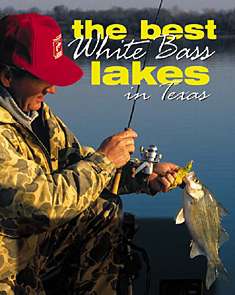|
The Best White Bass Lakes in Texas

By Allen Tarvid
Page 2
In the northeast corner of
the state, Wright Patman and the Sulphur River are the best of
the best. High numbers of whites enjoy tremendous growth in the
fertile system, pressing 10 inches in length in just their first
year.
Lake Caddo's Alligator Bayou
area can offer good white bass action from December on into the
spring run. The key is finding areas with the best current flow.
Usually, the area from Devil's Elbow down Government Ditch is
productive; the junction of Kitchen Creek with Cross Bayou is
another good spot.
Good spring runs take place
in the tributaries feeding Lake O' The Pines and Lake Caddo, but
the best is in the Sabine River from about Longview on down to
Toledo Bend Reservoir.
Improved tailraces below the
Wright Patterson and Lake O' The Pines dams offer good white bass
fishing for non-boating anglers.
In deep East Texas, Toledo
Bend probably has the biggest white bass. Fish up to 4 pounds
are common during the spring run up the Sabine River. During the
summer, whites seem to restrict themselves to the upper half of
the lake rather than move down to the dam. Few anglers go to Toledo
Bend for white bass, and unmolested schools of fish terrorize
the shad in the upper lake's boat lanes.
Sam Rayburn Reservoir also
has a considerable white bass population, with good spring runs
up the Attoyac and Angelina Rivers. River access is limited, and
the fish aren't as numerous or as big as those in Toledo Bend
(you have to put up with "little" pound-and-a-half fish).
During the rest of the year the whites tend to stay in the upper
one-third of the lake.
Moving back toward the center
of the state, Lakes Somerville and Livingston are great for white
bass. Somerville has good spring runs up Nails and Yegua Creeks,
and Livingston's White Rock and Caney Creeks are popular spots.
Somerville's tributaries pass through wildlife management areas,
so public access is good for anglers without boats. Livingston's
white bass commonly run 18 to 20 inches in length. Expect Somerville's
fish to run closer to 14 inches. Both lakes currently have a 12-inch
minimum size limit.
In the Dallas/Fort Worth area,
the lakes with the highest catch rates are Benbrook, Grapevine
and Lewisville. Ray Hubbard also has an excellent white bass population,
but it's overshadowed by its reputation for producing big hybrids.
Slightly east, near Corsicana,
Richland-Chambers is excellent in terms of both number and size
of fish. Cedar Creek Lake, just to the north, is a traditional
favorite that keeps on producing. Lake Athens is another good
bet. It has an abundance of 14- to 18-inch whites, and the local
fisheries people have trouble convincing fishermen that they are
really whites and not hybrid stripers.
About 30 miles south of the
Dallas/Fort Worth area, great white bass fishing in the Alvarado
city reservoir is a well-kept secret. In a sampling of about a
hundred fish, biologists were surprised to find that the average
size was a smidgen over 2 pounds. A bit farther south, Lake Whitney
continues to support great white bass action. Just east of Waco,
near Groesbeck, Lake Limestone is one of the area's best producers
year in and year out.
In the Austin/San Antonio area,
Canyon Lake is hard to beat. The 12-inch minimum length limit
instituted there about two years ago is improving the size of
the fish. The lake is popular with white bass anglers, and creel
surveys show that most do pretty well. The lake has recovered
from the '97 floods, and most parks and launching ramps are open
again. Canyon also supports a good spring run up the Guadalupe
River.
The best white bass lake in
Southeast Texas is Choke Canyon, south of San Antonio near Three
Rivers. A tremendous spawn took place four years ago and those
fish now weigh up to 2 pounds. The '98 spring run was washed out
by four bad rains and the harvest was low, so the schooling activity
this summer should be outstanding.
The spring run up the Nueces
River from Corpus Christi Lake is usually good, but the fish tend
to be a bit smaller than those in Choke Canyon. Lake Texana, just
southeast of El Campo, also has a great white bass population
and would be a standout if it weren't in competition with Choke
Canyon.
Many anglers have forsaken
white bass and shifted their pursuit to its larger cousins, the
striped and hybrid striped bass. Some have even switched to those
overgrown, big-mouthed members of the sunfish family that like
to be referred to as "bass."
It's tough to stay true to
any species of fish in the face of all of the great opportunities
in Texas. But while I've strayed to nearly all of the other fish,
my favorite ultralight and I keep coming back to the white bass.
# # # #
page 1 / page 2
| 




